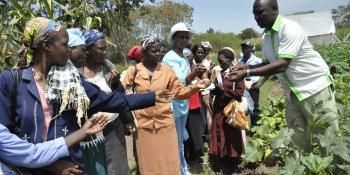Need for better coordinated climate science research in Africa

by East Africa Team
Good quality climate information is vital in managing climate risks. Consideration of user needs when delivering climate services is critical. This was a recurring theme of the Second Conference on Climate Change and Development in Africa (CCDA-II), which ran in mid-October in Addis Ababa, Ethiopia. The conference was organized by United Nations Economic Commission for Africa (UNECA) in collaboration with its partners in the Climate for Development in Africa initiative. It brought together over 300 participants from African member states, regional economic communities, river basin organizations, non-governmental organizations, and the private sector, academia and development partners.
“The key prerequisites for climate service delivery are available, dependable, usable, credible, authentic, responsive and sustainable,” said Mr Jeremiah Lengoasa, the World Meteorological Organization (WMO) Deputy Secretary General as he gave the keynote address during a session on Climate Service Delivery for Development. Participants in the session agreed that the research and science community need skillful and actionable forecasts, coupled with effective communication and a “knowing-the-market” approach to improve on the links between research and use. To take on this approach, participants emphasized the need to integrate indigenous knowledge with scientific forecasts to increase sensitivity to local information needs.

While great strides have already been made by regional climate outlook forums in delivering agro meteorological data and seasonal forecasts, there is need to improve information sharing with end-users such as farmers. Due to their increased prevalence, radio and mobile phones can be used to communicate useful messages to end-users in Africa. For instance, a pilot study undertaken by the CGIAR Research Program on Climate Change, Agriculture and Food Security (CCAFS) reveals that local language radio is suitable for communicating climate risk information to the grassroots.
Dr. Arame Tall, a climate–service scientist within CCAFS, further emphasized the need for creating effective partnership platforms in order to bridge the gap between scientists and end users. In Kaffrine, Senegal, for example, CCAFS is empowering farmers to better understand and use probabilistic seasonal climate information through training. In addition, the program has carried out an assessment of the risks associated with climate variability in Eastern Kenya, and the mitigation options. Working directly with farmers, CCAFS is testing the design and communication of downscaled, probalistic seasonal forecasts and evaluating their impact on farmers’ management and livelihood.
Mr. Bai-Mass Taal, Executive Secretary of the African Ministers' Council on Water (AMCOW) pointed out that, “Information coming from the science community is disjointed.” Climate science research in Africa is not well coordinated and is usually undertaken in an ad-hoc fashion. Participants therefore urge key institutions within and outside Africa to work together to identify research frontiers that advance Africa’s development and implement them. In an attempt to address this gap, the WMO has created the Global Framework for Climate Services (GFCS). In his presentation, Mr. Lengoasa said that the GFCS will support the systematic development of the institutions, infrastructure and human resources needed for effective climate services.
CCAFS and the International Livestock Research Institute (ILRI) also had an exhibition booth visited by participants from all over the world, keen to learn more about the links between climate change and agriculture.
This blog post was prepared by CCAFS East Africa Team: Regional Program Leader James Kinyangi, Maren Radeny, Science Officer and Catherine Mungai, Program Specialist. Follow the East Africa team on twitter.


